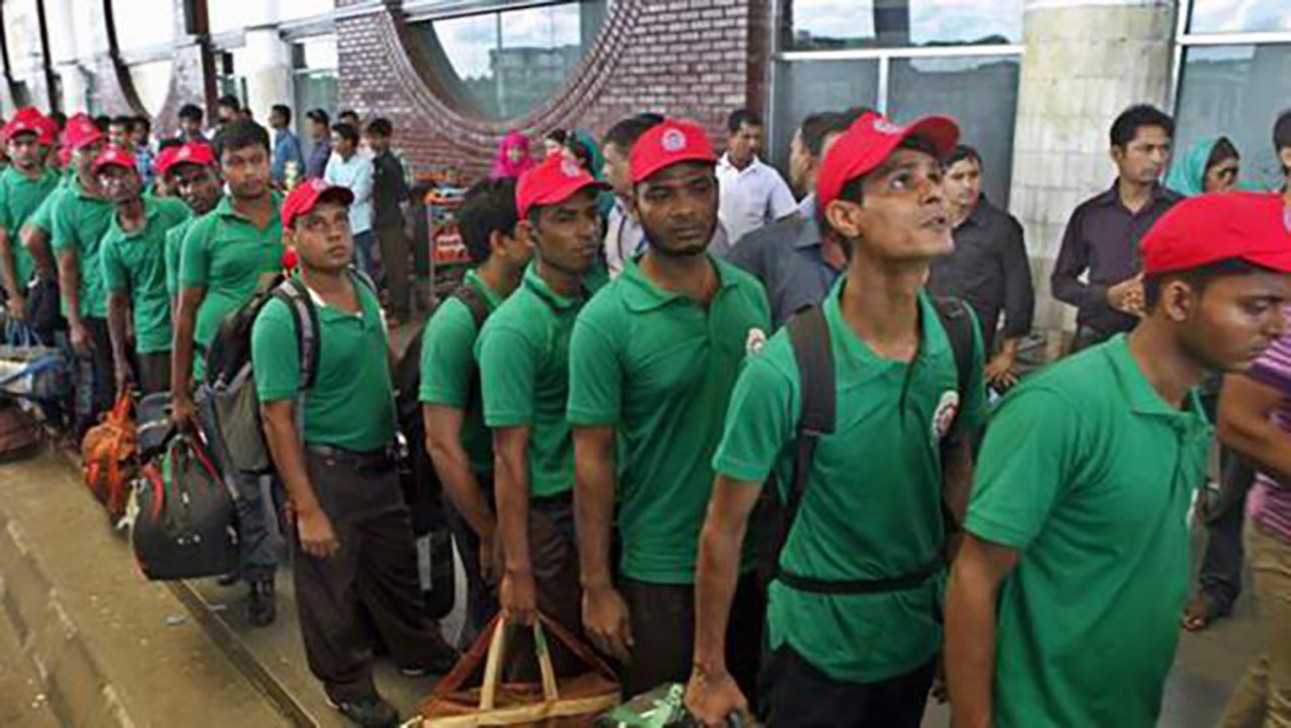Malpractices hurting overseas job sector

Image collected
Irregularities in the overseas jobs sector are making migrant workers go undocumented and are even contributing to the closing of labour markets, said Expatriates’ Welfare and Overseas Employment Minister Imran Ahmed on Sunday.
He was speaking at a press conference on the Bangladesh-Seychelles deal on labour recruitment signed on October 21. However, the issues of decline in overseas jobs, suspension of recruitment by Malaysia and the UAE, and deportation of migrants from Saudi Arabia also came up.
“For example, one agent gets work orders to send five workers to a company overseas. Agents have liability for three months. After that, if the workers flee, the agents don’t take the liability. So, they tell the migrants, ‘stay there for three months, then you flee…,” he said.
“If two workers flee, the employer sends work orders for two more and get them accordingly. Similarly, the workers are charged Tk two to five lakh. This is one of the types [of fraudulence] we have heard of,” the minister said.
Imran also said when female domestic workers go to the Middle East free of cost, there are other problems. For example, he said, in many cases the age of the females is shown either higher or lower than the actual one.
“Age limit for the women going abroad for domestic work is 25 to 38 years. But there were cases 18-year old girl’s age has been shown 25 years. Also, 55-year old women’s age in the passport was shown 36,” he said.
While more than 10 lakh Bangladeshis secured jobs overseas in 2017, that came down to 7.34 lakh last year. In the first eight months this year, 4.17 lakh Bangladeshis migrated overseas for jobs, and the projected figure by the yearend is 6.26 lakh.
The issues of undocumented Bangladeshis came up prominently as thousands of migrants are being deported by Saudi Arabia. This has also been a major issue in Malaysia where authorities have been conducting raids against irregular migrants, including those from Bangladesh.
On various occasions over the last one year, Bangladesh requested Malaysia to regularise the undocumented Bangladeshis (around 50,000 who were registered there under the Rehiring Programme during 2016 and 2018), but Malaysia said that they could not do so.
When the UAE restricted recruitment from Bangladesh in 2012, it did not cite any reason, but insiders said recruitment of surplus labour between 2007 and 2012 had caused many workers to become irregular, which was considered a major problem by the UAE.
According to the Bureau of Manpower Employment and Training (BMET), more than two lakh Bangladeshis migrated to the UAE each year between 2007 and 2012. The figure was much higher, more than 4.19 lakh, in 2008.
The case was similar in Malaysia, which had suspended recruitment from Bangladesh in early 2009 after recruiting high numbers of workers in the previous two years.
The Southeast Asian country, which had been recruiting from Bangladesh since 1990, never hired more than 68,000 Bangladeshis a year until 2006. The numbers went up strikingly to 273,201 in 2007 and 131,762 in 2008, according to the BMET data.
Malaysian NGO, Tenaganita, in its researches from 2007 had found that many of the Malaysian companies recruited excessive number of workers. For example, a company that required 50 workers would hire 100.
Tenaganita said the motive of the agents and illegal brokers was to make profit out of more recruitments, but that led to joblessness and exploitation, prompting Malaysia to freeze recruitment in 2009.
Even in 2018, Malaysia had hired 1.76 lakh Bangladeshis and about a lakh the previous year. While suspending, Malaysia had said a syndicate of ten recruiting agents was charging workers up to Tk 4 lakh (20,000 Malaysian Ringgit).
Shariful Hasan, head of Brac Migration Programme, said there is a clear link between sending excessive number of workers overseas and labour exploitation, deportation and even closure of labour markets. That is evident in the cases of Malaysia, the UAE and Saudi Arabia.
“Agents and brokers focus on the number of workers, not on their wellbeing. This is simply because they want money. Sending more workers means more money for them,” he told The Daily Star yesterday.
Hasan said this trend is causing serious economic and social problems in society, because many of the migrants face situations akin to human trafficking and return home physically and mentally harmed, and in debt.
“Interestingly, neither the recruiting agents nor illegal manpower brokers involved in such processes are held accountable,” he said.
Minister Imran Ahmad said his ministry is now maintaining ‘zero tolerance policy’ against those involved in recruitment irregularities. Bangladesh embassies and ministry officials are working together to this end, he added.
Asked how he is going to take action against the syndicates of manpower brokers and agents, he said, “We don’t have all the information. If you have any list of errant agents or brokers, please provide us with it. It will help.”
Source: https://www.thedailystar.net